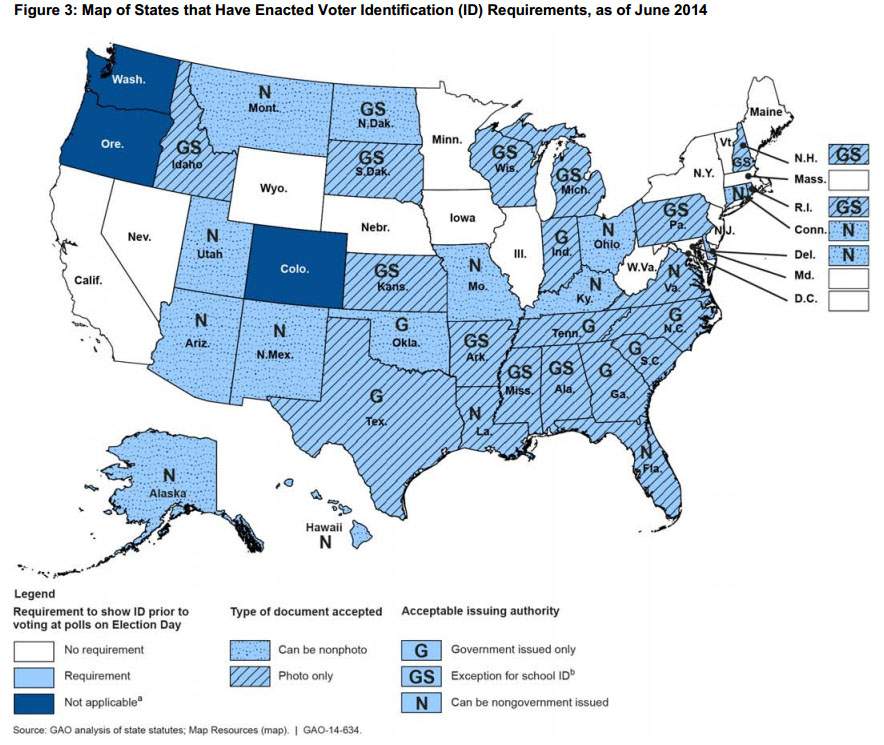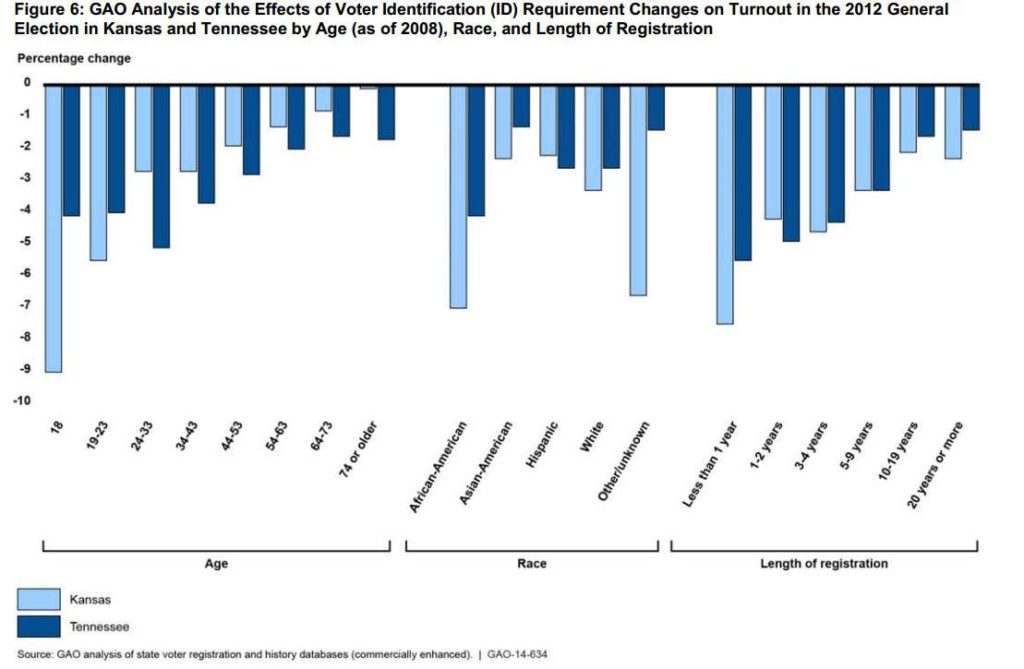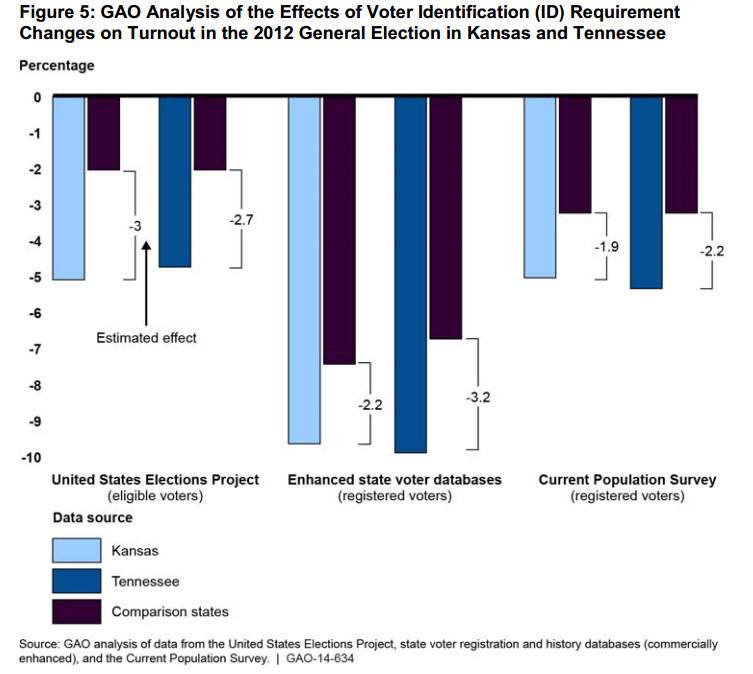Congressional study: laws reduced youth, black turnout
It’s safe to say it now. Voter ID is a scam.
That’s not exactly how the nonpartisan Government Accountability Office put it in their new hefty Voter ID report, but their comparison of registered voter turnout in six states leaves no further wiggle room.
GAO researchers crunched 2008 and 2012 election data in six states, including two (Kansas and Tennessee) that had passed voter ID laws. The data showed what so many have warned would be the net result of these laws.

“GAO’s analysis suggests that the turnout decreases in Kansas and Tennessee beyond decreases in the comparison states were attributable to changes in those two states’ voter ID requirements. GAO found that turnout among eligible and registered voters declined more in Kansas and Tennessee than it declined in comparison states — by an estimated 1.9 to 2.2 percentage points more in Kansas and 2.2 to 3.2 percentage points more in Tennessee.”
So, participation by eligible and registered voters declined, but the decrease was not equal across all population demographics. Specifically, according to the report, turnout was reduced by larger amounts:
• among registrants, as of 2008, between the ages of 18 and 23
• among registrants who had been registered less than 1 year
• among African American registrants
Voter ID laws disproportionately reduced turnout by eligible and registered young voters, new voters and black voters.
BECAUSE FRAUD?
As if the lengthy and expensive voter fraud probe launched by Iowa Secretary of State Matt Schultz wasn’t already enough to dispel the myth of rampant and widespread fraud at the polls — 117 possible cases were found among 1.58 million ballots cast, charges were brought in a few dozen cases, and fewer than 10 criminal convictions have resulted — GAO researchers had a look for themselves, using five independent studies as a foundation. They found:

• “No significant indicters of voter impersonation fraud in the 2012 general election.”
• “No suspicious anomalies found in voting patterns.”
• Five questionable votes, out of 2.1 million cast, in the Georgia 2006 general election, but local election officials did not respond to GAO requests for additional information. It remains unknown if these five questionable votes amounted to fraud.
• Ten confirmed cases of in-person voter fraud among more than 2,000 election fraud cases across the nation from 2000 to 2011.
• A total of 48 people charged with violating federal election laws from 1996 to 2005, a 10-year period, but no confirmation the charges stemmed from the in-person voting that voter ID laws target.
A safeguard known as the “provisional ballot” allows a person to cast a ballot on election day despite problems that may have completely prevented the individual from voting. In Iowa, for instance, a person who arrives at the wrong polling place or not shown on voting rolls may cast a provisional ballot. For states with voter ID laws, provisional ballots are often extended to those who arrive to vote and cannot produce the necessary ID.
In Kansas and Tennessee, the GAO found that while only a small portion of the ballots cast were provisional, use of this safeguard is on the rise. However, less than half of provisional ballots cast in those states were ultimately counted.
BALANCING ACT
Identification requirements do provide an additional level of assurance that in-person voters are who they proclaim to be. But the larger question continues to be if such fraud is widespread enough to justify requirements that disenfranchise eligible and registered voters.

That case has not been made, and evidence is overwhelming that voter ID laws reduce turnout in specific populations, which casts the shadow of political motivation across the entire process.
U.S. Supreme Court Justice John Paul Stevens noted in the 2008 ruling upholding an Indiana law that the type of fraud the law was targeting simply did not exist. The record, he said, “contains no evidence of any such fraud actually occurring in Indiana at any time in its history.”
The Brennan Center for Justice at New York University Law School added that voter impersonation was “more rare than death by lightning.”
Yet we now have 33 states with some form of voter ID law, the vast majority at the impetus of Republicans.
In Pennsylvania the Republican-controlled legislature in 2011 and 2012 enacted voter ID, ended same-day registration and restricted early voting — specifically targeting Sunday, which local African American churches had used as “Souls to the Polls” programming. In speaking of these accomplishments, the GOP leader of the Pennsylvania House said, “Voter ID, which is gonna allow Gov. Romney to win the state of Pennsylvania, done.”
University of Massachusetts at Boston research shows a correlation between restrictive voting laws and states where Republicans control the legislature or governor’s office. Those researchers conclude that photo identification, proof of citizenship, tighter voter registration drives, shorter early voting periods, repeal of same-day voter registration and other voter ID laws “collectively reduce electoral access among the socially marginalized.” In short, states in which minority turnout had increased since the previous presidential election were more likely to pass restrictive legislation, especially if the governor’s office and legislature were GOP-controlled.
BUCKING HISTORY
Fortunately, Iowa has historically been progressive on matters related to civil rights.
In 1839, the Territorial Supreme Court ruled “no man in this territory can be reduced to slavery.” The nation didn’t agree until 1865, after the Civil War.
In 1851, the Iowa General Assembly removed a ban on interracial marriage. Again, the nation didn’t catch up until 1967.
The Iowa Code of 1851 gave married women property rights. In 1867, the Iowa Supreme Court decided men shouldn’t always and absolutely gain custody of children following a divorce and, in 1868, said a 12-year-old girl could not be barred from school because of her race.
The next year, in 1869, Arabella Mansfield was told a woman could practice law, and she became the first female lawyer in the U.S.
The list goes on and on — from the free speech ruling in Tinker vs. Des Moines Independent School District to the state’s 1976 abolition of sodomy laws to the more recent marriage decision.
When the only impetus to enact voter ID laws is partisan politics or false security, why buck history?
This column by Lynda Waddington originally published in The Gazette on Oct. 12, 2014.
